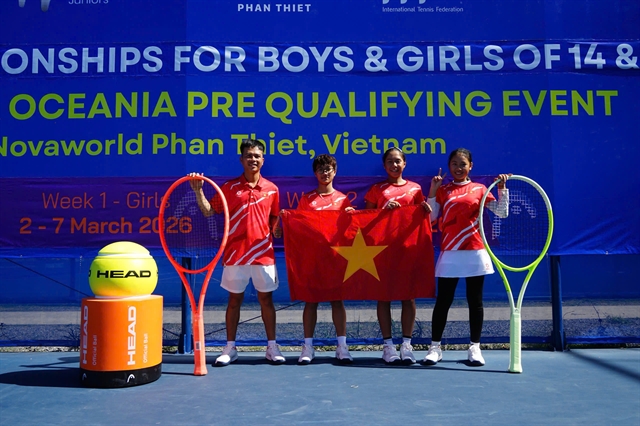 Economy
Economy
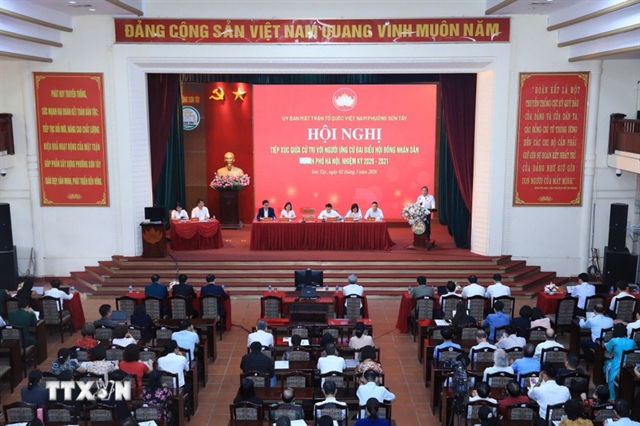
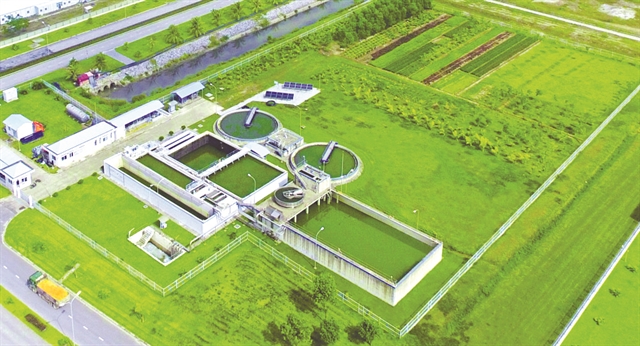 |
| Wastewater treatment plant of DEEP C Industrial Zones - DEEP C - one of Việt Nam's first eco-industrial parks. Leading firms have spearheaded substantial investments in sustainable business practices, aligning with the global trend towards achieving net zero by 2050. Photo courtesy of DEEP C |
By Vũ Hoa
Việt Nam’s journey to a net-zero future requires collective efforts from the government, businesses, and society. By embracing sustainability, the business community—particularly private firms—can not only advance environmental goals but also seize opportunities for innovation and growth.
According to Nguyễn Quang Vinh, vice president of the Việt Nam Chamber of Commerce and Industry (VCCI) and chairman of the Việt Nam Business Council for Sustainable Development (VBCSD), the definition of business success has evolved. Today, society considers not only economic indicators but also the impact businesses have on environmental protection, social well-being, and community benefits.
“Sustainable development, particularly through the promotion of a circular economy, has become an essential strategy for businesses seeking long-term viability. Traditional business practices are no longer optimal; companies must now embrace the concept of 'nature-positive business', which is gaining traction within the global business community,” Vinh said.
"Today, enterprises around the world are not just focused on developing and implementing sustainable strategies internally. They are also investing resources to enhance the participation and capacity of suppliers and stakeholders throughout their value chains, fostering a sustainable ecosystem."
Vinh noted that Vietnamese businesses had significantly increased their awareness of sustainable development and green transformation compared to 5–10 years ago. Leading firms, in particular, had made substantial investments in sustainable business practices, aligning with the global trend towards achieving net zero by 2050.
For example, members of the VBCSD-VCCI had effectively communicated the message of green growth and transformation both within their companies and across their value chains to partners.
“Vinamilk, Greenfeed, Traphaco, PAN Group, and other leading firms are effectively applying green, clean, low-emission business models, incorporating circular elements deep into their production chains, while creating sustainable livelihoods for disadvantaged communities through inclusive business models,” he said.
Vital role of private enterprises
At a recent meeting with the business community, Minister of Planning and Investment Nguyễn Chí Dũng said large enterprises, equipped with substantial financial resources, research and development capabilities, a skilled workforce, extensive experience, and well-established brands, were now poised to take on greater responsibilities.
He added that the importance of businesses and entrepreneurs had been consistently reaffirmed.
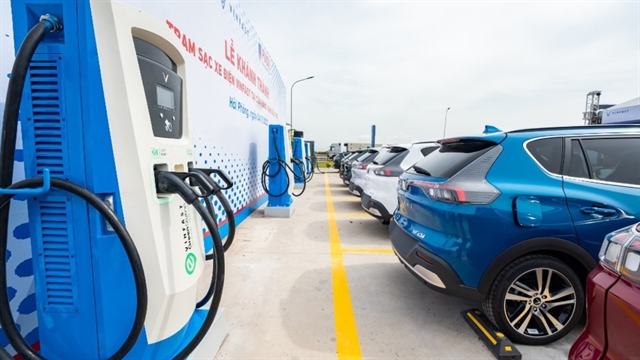 |
| A VinFast electric car charging station in Hải Phòng. Vingroup launched the 'Strong Vietnamese Spirit – For a Green Future' campaign to drive the green transition in Việt Nam. Photo vinfast.vn |
Over the past 40 years of the Đổi mới (Renewal) process, Việt Nam had seen the establishment of over 930,000 active enterprises, with 98 per cent classified as small- and medium-sized.
Additionally, there were approximately 14,400 cooperatives and over 5 million business households. Notably, a strong cadre of private enterprises had emerged, demonstrating significant capabilities in capital, technology, and corporate governance, with brands recognised in regional and global markets such as Vingroup, Thaco, and Hòa Phát.
Many large private enterprises had proactively transformed their operations, investing boldly in new industries and pioneering innovative business models focused on sustainability and the circular economy.
This evolution had positioned them as leading forces driving the development of key sectors within the economy. As a result, thousands of SMEs and business households had benefited from partnerships with these industry leaders, Dũng said.
Growth must evolve beyond reliance on capital and resource exploitation, according to the minister. It should increasingly depend on science, technology, and innovation. This entails revitalising traditional growth drivers and embracing new ones rooted in the circular economy, digital economy, and innovative economic models.
The 13th National Congress of the Việt Nam Communist Party in January 2021 set ambitious goals for Việt Nam: to become a developing country with a modern industry and high average income by 2030, and to achieve developed country status with high income by 2045.
To realise these aspirations, large private enterprises play a vital role. This sector holds significant resources in capital, assets, technology, and high-quality human resources.
International experience indicates that large enterprises are crucial to economic development in both developed and low- to middle-income countries, contributing significantly to growth, employment, budget revenue, exports, and taxation.
According to World Bank estimates, 80 per cent of global profits are generated by the top 10 per cent of enterprises. Large firms contribute, on average, one-third of export turnover and half of a country's export growth.
The remarkable advancements of countries like South Korea and Japan are closely tied to their prominent private brands, such as Samsung, Hyundai, SK, Honda, and Toyota,
By the end of 2023, the total assets of large private enterprises in Việt Nam are projected to reach approximately $70 billion.
Mobilising these assets, along with the technology, knowledge, management skills, and high-quality personnel they offer, would provide substantial resources for the economy and enhance the country’s economic autonomy, Dũng said.
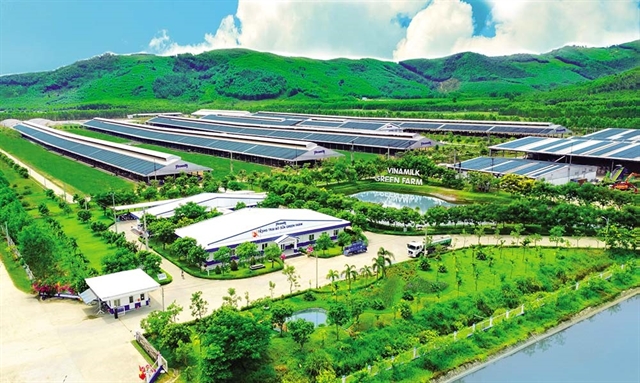 |
| Vinamilk's Green Farm in Tây Ninh, Quảng Ngãi and Thanh Hóa is a typical model of sustainable agriculture. Photo courtesy of Vinamilk |
Sustainable business practices
Vinamilk stands out as one of the few companies that recognised the importance of ESG (Environmental, Social and Governance) practices earlier, even as many other businesses have yet to prioritise this trend.
Through its commitment to sustainable agricultural practices, Vinamilk is now reaping the rewards from its "ESG seeds". In recent years, it has been honoured as the most sustainable brand in Việt Nam and is the only dairy brand in Southeast Asia to rank among the Top 5 most sustainable dairy brands globally.
This focus on sustainable development also reflects positively on Vinamilk's financial health. The company has attracted foreign investment due to its strong ESG performance, consistently ranking in the Top 20 of the HOSE Sustainable Development Index since 2017.
Its sustainable practices have also led to significant cost savings. For instance, the GreenFarm Tây Ninh, which houses 8,000 cows and calves, discharges 500 tonnes of manure daily. Its biogas treatment system converts this waste into 100 per cent organic fertiliser for 500 hectares of grassland, effectively addressing environmental challenges.
Talking about Vinamilk's commitment to achieving its net zero goal by 2050, CEO Mai Kiều Liên said: “The conversation around net zero is far-reaching, addressing numerous challenges a business must tackle. However, regardless of the issues at hand, this journey represents a set of values that Vinamilk prioritises above all else, never measuring them against financial considerations.”
Liên emphasised that "sustainable development is not a competition; each business contributes in its own way". Achieving the net zero goal would require collaboration, not isolation.
“If there is a race, it’s a race against time itself,” Liên said.
“While businesses will experience fluctuations, the pursuit of sustainable development must stem from a sense of responsibility—acting on what we believe is necessary, even when it’s not mandated.”
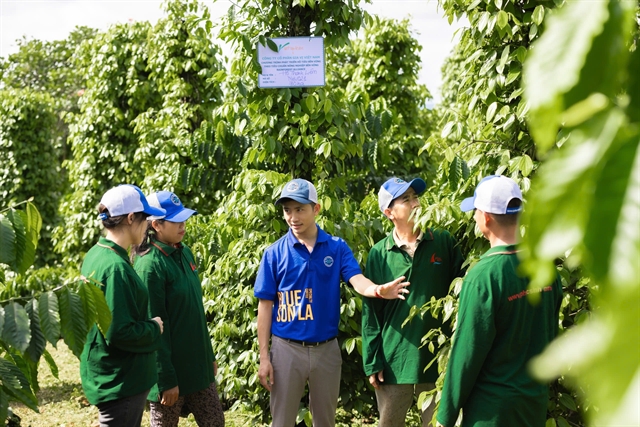 |
| Phúc Sinh engineers visit a sustainable pepper farm to provide training for local farmers, as part of a sustainable development project the company has been actively implementing for the past 14 years. Photo courtesy of Phúc Sinh Group |
Liên pointed out that the most significant hurdle was the “newness” of the endeavour. The global dairy industry had a history of around 300 years, while Việt Nam’s dairy sector had only been developing for about 60 years. Sustainable development was a relatively recent field for the entire dairy industry, and it demanded long-term commitment.
“Arguably, the greatest challenge lies in people. Success or failure hinges not on money, finance, or technology, but on the individuals involved. I often remind my colleagues that the world is evolving rapidly," Liên said.
"At Vinamilk, we must foster a culture of self-reliance and continuous improvement, always willing to rethink our practices for better outcomes.”
Phúc Sinh Group achieved a remarkable “hat-trick” in 2024 by securing three green funding sources from European investment funds, underscoring its unwavering commitment to sustainable development.
Fourteen years ago, instead of investing VNĐ5 billion (US$250,000) in land, Phan Minh Thông, chairman and general director of Phúc Sinh Group, chose to allocate all his resources to ESG initiatives. At that time, this was a significant investment, made entirely from his own funds.
“Five key factors have contributed to Phúc Sinh's successful ESG practice: a deep understanding of local culture, perseverance, stable financial management, a clear vision, and transparency,” Thông told Việt Nam News.
He noted that while ESG practices might not have yielded immediate results in the past, 2024 marked a turning point where the benefits were becoming evident. The European market now presented two critical challenges: compliance with food safety and hygiene (FSH) standards, and traceability in the fight against deforestation.
A decade ago, the EU regulated around 220 banned substances; today, that number had risen to 850. They were rigorously enforcing anti-deforestation laws, requiring exporting countries to adhere to these standards. Some shipments from Việt Nam, weighing hundreds of tonnes, had been returned due to untraceable origins.
“On the positive side, these new regulations will lead to healthier food options for Vietnamese consumers, as farmers recognise the importance of maintaining large growing areas to prevent cross-contamination," Thông said.
"Additionally, these challenges present opportunities for exporting to markets like South Korea and Taiwan, which adopt European import standards. Ultimately, Phúc Sinh will benefit, and the entire system will adapt to address these challenges effectively.”
VBCSD’s chairman Vinh, said Việt Nam, as an open economy, had implemented 16 free trade agreements and was currently negotiating three more.
While these agreements promote business collaboration and growth, they also present challenges, as companies must adapt to global standards and regulations, according to the chairman.
However, Vietnamese businesses face significant obstacles, including limited awareness of sustainable development, a lack of understanding of high environmental and social standards, outdated technologies, weak management practices, and constrained resources.
“To overcome these challenges and seize opportunities for sustainable development and long-term prosperity, Vietnamese businesses must not only shift their mindsets and enhance corporate governance but also consider transforming their value chains," Vinh said.
"Achieving sustainable development goals requires building a resilient ecosystem through increased engagement and capacity building for suppliers and stakeholders along the value chain.”
He also emphasised that the business community played a vital role in driving economic and social development and contributing to the nation’s long-term prosperity, as reaffirmed in Resolution 41 issued by the Politburo last year. This resolution signaled a commitment to fostering a supportive environment for businesses.
Vinh said he believed "we can expect more favourable policies in the future to aid the business community in adopting sustainable and responsible practices". VNS




